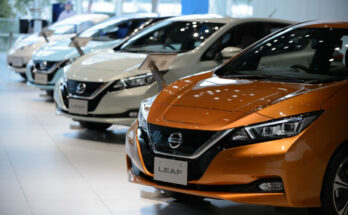The rapid adoption of electric vehicles (EVs) is reshaping the automotive landscape, posing significant challenges to conventional automakers and their associated spare parts industries.
Related: Expensive Electric Vehicles (EVs) in Pakistan: A Luxury Beyond the Reach of the Masses
Unlike internal combustion engine (ICE) vehicles, EVs operate with fewer mechanical components, leading to reduced maintenance needs and altering the traditional revenue streams for automakers and spare part providers. Here’s an analysis of why EVs are considered a disruptive force in the automotive industry.
Simplified Drivetrain: Fewer Moving Parts
One of the key reasons EVs are a threat to conventional automakers and spare parts businesses is their simplified drivetrain. Unlike ICE vehicles, EVs do not require:
- Engines: ICE vehicles rely on complex engines with hundreds of moving parts, such as pistons, valves, and timing belts. EVs replace this with an electric motor that has significantly fewer components.
- Gearboxes: While ICE vehicles require multi-speed transmissions to deliver power efficiently, EVs typically use a single-speed transmission, reducing complexity and wear.
- Exhaust Systems: With no combustion involved, EVs eliminate the need for exhaust systems, catalytic converters, and mufflers, which are significant revenue sources for parts manufacturers.
This fundamental difference means less wear and tear, fewer parts needing replacement, and reduced demand for related spare parts.
Elimination of Fluids and Oils
EVs do not require several fluids and oils essential for ICE vehicles:
- Engine Oil: EVs do not have combustion engines, thus eliminating the need for regular oil changes.
- Transmission Fluids: With simpler single-speed gear systems, EVs reduce the need for specialized transmission fluids.
- Coolants: While EVs require some form of cooling for the battery, the absence of engines and radiators reduces the need for traditional coolant systems.
These changes impact industries that thrive on producing, distributing, and servicing such products.
Longer Maintenance Intervals
EVs are inherently more reliable than ICE vehicles because they:
- Have fewer moving parts, reducing mechanical failures.
- Use regenerative braking, which reduces wear on brake pads and discs.
- Lack of belts, chains, and fuel pumps, which are common failure points in ICE vehicles.
This translates into fewer visits to workshops, cutting into the revenue of service centers and spare parts businesses.
RelatedL Are Electric Cars Viable for Pakistani Consumers?
Impact on Secondary Markets
The growth of EVs also disrupts secondary markets that rely on ICE vehicles:
- Used Parts Dealers: Salvage yards that thrive on reselling engine components, radiators, and transmissions may see a decline in inventory and demand.
- Performance Tuning Shops: ICE vehicles have a robust aftermarket tuning industry. EVs, being software-driven, reduce opportunities for mechanical performance upgrades.
- Fuel Station Services: Many gas stations double as repair shops, and the decline in ICE vehicles could lead to reduced foot traffic and revenue.
Challenges for Conventional Automakers
Automakers that have built their business models around ICE vehicles face steep challenges:
- Re-tooling Costs: Shifting to EV production requires significant investment in new manufacturing technologies and skills.
- Supply Chain Adjustments: Traditional suppliers of ICE components may become obsolete, forcing automakers to develop new partnerships for EV-specific components like batteries and inverters.
- Reduced After-Sales Revenue: Automakers rely heavily on after-sales services, which EVs diminish due to their lower maintenance requirements.
Rise of EV-Specific Components
While EVs eliminate many traditional parts, they create demand for new components:
- Batteries: The heart of an EV, batteries are expensive and require specialized maintenance.
- Power Electronics: Components like inverters and controllers are crucial in EVs.
- Electric Motors: While simpler than ICEs, motors require precision engineering.
However, these components often come with longer lifespans and are less likely to need frequent replacements, further diminishing recurring revenue.
Opportunities in the EV Transition
While the rise of EVs poses challenges, it also offers opportunities:
- Battery Recycling: As EV adoption grows, so will the need for recycling lithium-ion batteries, creating a new industry segment.
- Software and Diagnostics: EVs are heavily software-driven, opening opportunities in software development and diagnostics.
- EV-Specific Service Centers: Specialized service centers for battery maintenance, motor repairs, and software updates are emerging as a new niche.
The EV resistance can be observed in Pakistan by local automakers since Pakistan’s auto sector is dominated by Japanese players who are globally considered laggards when it comes to electric vehicles. Japanese players will always push towards hybrids since it is the area where they excel, and hybrids have technically more parts & components than a conventional ICE car, which in turn, keep the wheels of the Japanese spare part business spinning.
Related: Japan Could Lose 14% of GDP & Millions of Jobs by Stalling on EVs
Electric vehicles are not just an evolution in automotive technology; they represent a paradigm shift that threatens the established norms of conventional automakers and the spare parts industry. Their simpler design, reduced maintenance needs, and reliance on software and electrification disrupt traditional business models. To remain competitive, automakers and spare parts businesses must adapt to the changing landscape by embracing EV technology and finding new revenue streams in a world that is rapidly electrifying.

A computer animation professional with over 23 years of industry experience having served in leading organizations, TV channels & production facilities in Pakistan. An avid car enthusiast and petrolhead with an affection to deliver quality content to help shape opinions. Formerly written for PakWheels as well as major publications including Dawn. Founder of CarSpiritPK.com




